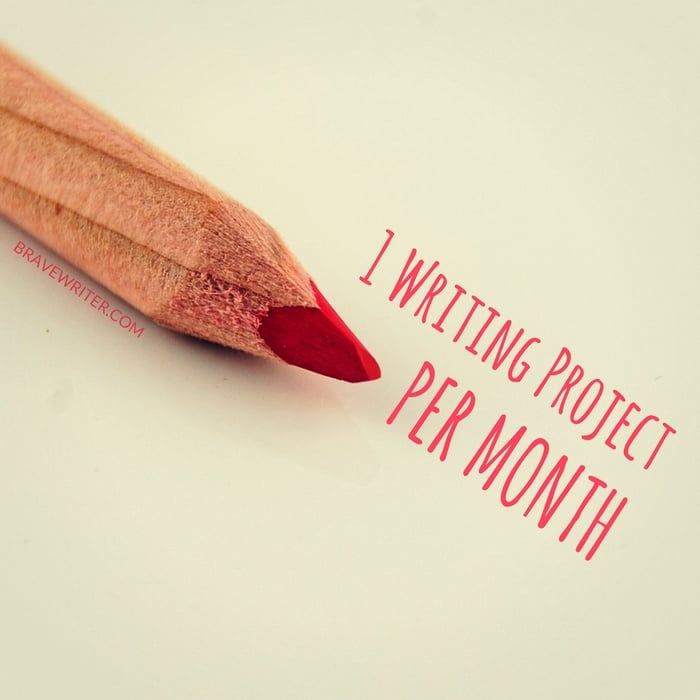
Brave Writer philosophy suggests that you only tackle one writing project per month, per kid. That’s right. One a month. I figure you’ll get sidetracked by Thanksgiving or surgery or a ski trip during a couple of those months meaning, you may not complete the project slated for that month. Therefore, if you have ten projects slated and get 6-7 of them through the revision process in a school year, be happy! You’ve done good work!
But wait, how does this work? you ask. I understand. It sounds like so little output. So let me give you some guidelines for why writing less equals more value.
Let’s look at the four week process for writing any piece (paragraph, letter, essay, poem, article, story).
Week One: Saturation
During the first week, you aren’t writing. You’re reading, talking, watching videos, looking stuff up on the Internet. You might also be doing the thing you will write about. If the topic is Native American basket weaving, perhaps you will even try to weave a basket! No writing comes forth without saturation in the topic/subject matter. This is why we always recommend that your kids write about what they know well. They’ll have richer vocabulary and a deeper grasp of the topic. If the topic is new-ish to your student, you need more time to absorb the material before becoming saturated. Might take two weeks or three. Don’t rush it. Writing is the result of an overflow of knowledge about a topic. You can’t read a paragraph about Columbus and then require your child write a paragraph about Columbus. The sane response from a child is: But didn’t we just read about Columbus?
Week Two: Freewriting
The second week is when you put pen to page. This is the time to get words from the guts upchucked onto paper. We do this in any way we can. We use freewriting to help catalyze that process. You can do several freewrites over a period of days. There’s no law in the writing world that says the first draft is the only draft. You can select parts of the topic to write about and do those over two or three days with breaks in between. During the freewriting (or drafting) week, the goal is to get as much raw writing to work with as possible. Think of a specific aspect of the topic (gathering materials for basket weaving) and write about it. Then on another day focus on another aspect (patterns in basket weaving). Break it up! Makes life so much happier.
Week Three: Revision
Revision is not the same thing as editing (when I use the term). Revision is injecting new vision into the raw writing. It’s re-imagining the piece so that it springs to life. During revision, you want to focus on content, not mechanics. That means you’ll read the freewrites and look at places you can narrow the focus and expand the writing. Perhaps your child wrote, “Basket weaving is hard work.” You can look at that sentence and ask for more! What does he mean by “hard work”? Can he describe the process? And so on. You might want to rewrite the opening line (I always recommend that). Make it pop, surprise, sizzle. Draw the reader right in. Revision can take many days or short bursts of energy tackling a little bit at a time. Don’t do it all in one day. Don’t fatigue your young writer. Revise two or three important content related items and leave the rest alone. (Psst. I promise anything you don’t correct in this piece will magically reappear in another for you to address at a later date.)
Week Four: Mechanics Mop-up
Now you edit. Editing is simply cleaning up all the stuff that makes the paper hard to read: misspellings, missing punctuation, grammar errors, typos, indentations. Have your child look over his or her work first. Let the student find as many errors as possible. You only make the additional changes once the child has taken a whack at it. Never complain about something he or she missed. Make a mental note that you need to address the semi-colon in copywork or dictation. Let what they miss be information to guide you in teaching; don’t use it as a way to shame your child. Print and share with readers.
Once you work through this process, you’ll have had a rich experience of how writing is supposed to work. Believe me, doing this 5-6 times in a year is a huge amount of teaching! Far superior to cranking out contrived paragraphs based on tedious writing prompts in a workbook. Give your kids the chance to experience what writers actually do. They saturate and incubate. They mess around with words, getting their ideas onto the page or computer screen however they might. They revise those words once they get a little distance to make them more compelling and interesting. Then they mop up the mistakes and share it with readers! Your kids get to do that too. For more information on how to do this process, see The Writer’s Jungle.





















